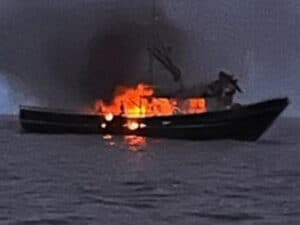
OPCs to have advanced Auxiliary Propulsion Systems
Written by Nick Blenkey
APRIL 17, 2015 — Leonardo DRS, Inc., Arlington, VA, reports that it has been awarded a contract by Eastern Shipbuilding to provide hybrid electric drive systems for the U.S. Coast Guard’s new fleet of Offshore Patrol Cutters (OPCs).
The contract, for the first nine systems, is worth $10.7 millionand will see Leonardo DRS provide its high-performance, permanent magnet motor-based Auxiliary Propulsion System.
This integrated hybrid electric drive system provides capability for the ship to operate much more efficiently at slower speeds, increases mission duration capability, reduces emissions and provides emergency take-home capability in the event of a failure of the main propulsion diesel engines.
When coupled to the main propulsion gearbox, the system allows the ship to operate quietly and efficiently during loitering operations while providing superior fuel economy for increased on-station operations and capability.
“DRS is a pioneer in naval hybrid electric drive technologies and we are proud to be able to deliver these advanced systems to the Coast Guard’s newest generation of ships,” said Dianne Howells, Vice President of Leonardo DRS Surface Ships business unit. “Our Auxiliary Propulsion Systems will give the crews of these new ships operational flexibility when they need it, while significantly increasing cost savings in yearly maintenance and fuel.”
Leonardo DRS says its Auxiliary Propulsion System includes two of the most power-dense permanent magnet motors on the market today, offering significant advantages in size, weight, efficiency and performance over conventional electric induction motors and producing more torque from the same amount of supplied current. Their smaller footprint allows greater flexibility in engine room design and increased cargo space, and their simpler more rugged construction results in proven reliability and durability.
Using propulsion diesel engines at slow speeds adds significant wear and tear on the engines and increases the potential for coking/wet stacking. By adding this electric Auxiliary Propulsion System, the Coast Guard will have a built-in advantage of reducing not only fuel and maintenance requirements, but total lifecycle costs and increased safety for the fleet.





Leave a Reply
You must be logged in to post a comment.